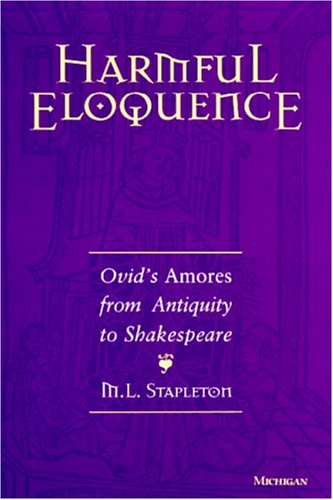Artículos relacionados a Harmful Eloquence: Ovid's "Amores" from...

Harmful Eloquence begins with a detailed analysis of the Amores themselves and their artistic unity. It moves on to explain the fragmentary transmission of the Amores in the "Latin Anthology" and the cohesion of the fragments into the conventions of Medieval Latin and troubadour "courtly love" poetry. Two subsequent chapters explain the use of the Amores, their narrator, and the conventions of "courtly love" in the poetry of both Dante and Petrarch. The final chapter concentrates on Shakespeare's reprocessing and parody of this material in his sonnets.
Harmful Eloquence analyzes the intertextual transmission of the Amores in major medieval and Renaissance love poetry for the first time. No previous study has devoted itself exclusively to this Ovidian text in this particular way. The premise that Ovid consciously used the device of persona from the very beginning of his writing career is fully explored, as is the "Ovidian hypothesis" of Wilibald Schroetter. Connections between Dante's La vita nuova and the Amores are newly discovered; significant for Shakespeare studies, the use of Christopher Marlowe's translation of the Amores by Shakespeare in his "dark lady" sonnets is also carefully analyzed for the first time.
Medievalists, classicists, and scholars of Renaissance studies will find Harmful Eloquence particularly engaging and useful, as will all those interested in the process and methods of literary transmission.
M. L. Stapleton is Associate Professor of English, Stephen F. Austin University.
M. L . Stapleton's Harmful Eloquence: Ovid's "Amores" from Antiquity to Shakespeare traces the influence of the early elegiac poetry of Ovid (43 b.c.e.-17 c.e.) on European literature from 500-1600 c.e. The Amores served as a classical model for love poetry in the Middle Ages and the Renaissance and were essential to the formation of fin' Amors, or "courtly love." Medieval Latin poets, the troubadours, Dante, Petrarch, and Shakespeare were all familiar with Ovid in his various forms, and all depended greatly upon his Amores in composing their cansos, canzoniere, and sonnets.
Harmful Eloquence begins with a detailed analysis of the Amores themselves and their artistic unity. It moves on to explain the fragmentary transmission of the Amores in the "Latin Anthology" and the cohesion of the fragments into the conventions of Medieval Latin and troubadour "courtly love" poetry. Two subsequent chapters explain the use of the Amores, their narrator, and the conventions of "courtly love" in the poetry of both Dante and Petrarch. The final chapter concentrates on Shakespeare's reprocessing and parody of this material in his sonnets.
Harmful Eloquence analyzes the intertextual transmission of the Amores in major medieval and Renaissance love poetry for the first time. No previous study has devoted itself exclusively to this Ovidian text in this particular way. The premise that Ovid consciously used the device of persona from the very beginning of his writing career is fully explored, as is the "Ovidian hypothesis" of Wilibald Schroetter. Connections between Dante's La vita nuova and the Amores are newly discovered; significant for Shakespeare studies, the use of Christopher Marlowe's translation of the Amores by Shakespeare in his "dark lady" sonnets is also carefully analyzed for the first time.
Medievalists, classicists, and scholars of Renaissance studies will find Harmful Eloquence particularly engaging and useful, as will all those interested in the process and methods of literary transmission.
M. L. Stapleton is Associate Professor of English, Stephen F. Austin University.
"Sobre este título" puede pertenecer a otra edición de este libro.
- EditorialThe University of Michigan Press
- Año de publicación1996
- ISBN 10 0472107070
- ISBN 13 9780472107070
- EncuadernaciónTapa dura
- Número de páginas220
Gastos de envío:
EUR 30,00
De Alemania a Estados Unidos de America
Los mejores resultados en AbeBooks
Harmful Eloquence: Ovid's "Amores" from Antiquity to Shakespeare.
Descripción Hardcover with dust jacket. Condición: Sehr gut. XI, 175 p. Lediglich der Schutzumschlag ist leicht berieben, sonst ein sehr gutes Exemplar ohne Anstreichungen / Only the dust jacket is slightly rubbed, otherwise a very good copy without annotations. - Contents 1. "Non sum desultor Amoris": The Amores and Personae 2. Ovidius sine titulo: The desultor Amoris before 1100 3. "Dirai vos de con": Ovid and the Troubadours 4. "Io non lo nvidio": Dante s Vita nuova and the desultor Amoris 5. "La dolce vista": Petrarch s Exorcism of the desultor 6. "After that I loathe, I runne": Shakespeare s Sonnets 127-54 and Marlowe s All Ovids Elegies Afterword Bibliography Index. ISBN 9780472107070 Sprache: Englisch Gewicht in Gramm: 516. Nº de ref. del artículo: 1225878

